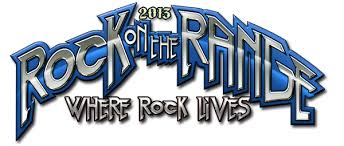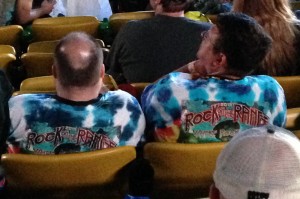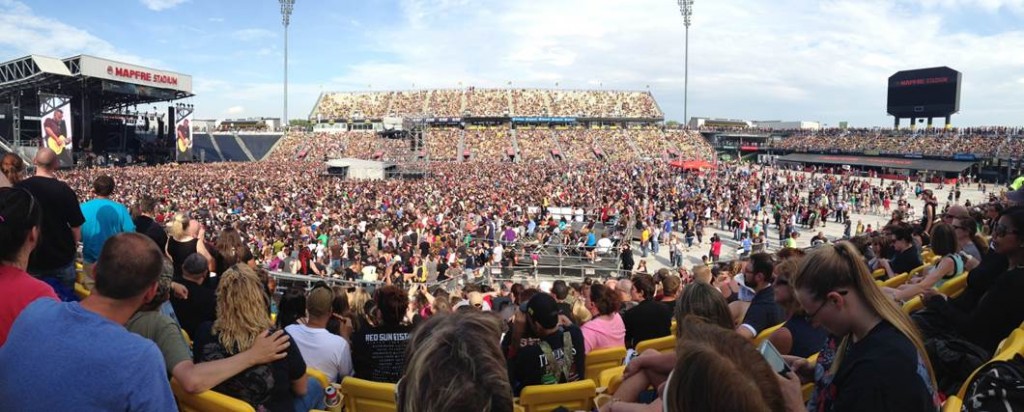 Mike Stern recently made the supreme sacrifice and attended Rock On The Range, a music festival devoted to ROCK that has been around since 2007. It takes place in both Winnipeg and Columbus, Ohio, and features non-stop Rock bands, covering the entire spectrum on multiple stages.
Mike Stern recently made the supreme sacrifice and attended Rock On The Range, a music festival devoted to ROCK that has been around since 2007. It takes place in both Winnipeg and Columbus, Ohio, and features non-stop Rock bands, covering the entire spectrum on multiple stages.
This year (in Ohio), headliners included Papa Roach, Slipknot, Breaking Benjamin, and Linkin Park. Newer bands like Rise Against, Rival Sons, and Volbeat were also represented, along with blasts from the metal past like Judas Priest and Marilyn Manson.
In all, there were more than 60 bands at this year’s event, along with comedy as well. Mike survived his weekend at Rock On The Range, and after getting a little sleep, related this story about the state of Rock music – and Rock Radio. – FJ
If Rock is indeed dead, no one told the 120,000 people who attended Rock On The Range two weekends ago. Not only did the festival sell out all three days, there were over 60 radio stations and digital media partners on hand covering the event, interviewing artists, and feeding the passion of this experience back to fans that couldn’t be there in person.
 Now I’m not new to festival going. I’ve been to Lollapalooza most years since it became a permanent fixture in Chicago, survived the mud at Woodstock ‘94, and even went to something called Edenfest outside of Toronto. But becoming a “ranger” was notably different, and it left me with some thoughts to share about the state of rock today.
Now I’m not new to festival going. I’ve been to Lollapalooza most years since it became a permanent fixture in Chicago, survived the mud at Woodstock ‘94, and even went to something called Edenfest outside of Toronto. But becoming a “ranger” was notably different, and it left me with some thoughts to share about the state of rock today.
Conventional wisdom has long suggested that Country defies generational divides, by appealing to fans of all ages. Rock, on the other hand, has always been a genre that could be fragmented by age and other factors. As the theory goes, fathers and sons enjoy Country together, while Rock is the music of rebellion. And no one wants to rebel with their parents on hand. Thus, we have radio stations that specialize in Rock, Alternative, and Classic Rock that each serves defined generations.
But observing the Rock On The Range crowd, that may not be the case anymore. There were plenty of families rocking together. And not just little kids who got dragged to the festival with mom and dad. During Marilyn Manson’s set, I noted a middle-aged couple, their twentysomething daughter and her boyfriend all rocking out together. And not just to hits like “The Beautiful People” or “Sweet Dreams” either. All four knew every word to songs I wasn’t even familiar with.
This wasn’t a rare occurrence. For the most part there were no generation gaps on display. Mature concertgoers went to see new artists, while young rockers cheered loudly for every cover song, regardless of the decade it was recorded in.
That certainly speaks to the articles we’ve seen – and written about – that chronicle how Classic Rock is finding new fans among Millennials. It also highlights the fact that there isn’t a monolithic rock sound that is galvanizing young people today. Much of today’s new rock sounds eerily similar to what was being released a couple of decades ago. Until there is another revolution like Grunge in the early ‘90s or the British Invasion in the ‘60s, rock may no longer be divided by age barriers. Don’t hold your breath.
But looking into the future, there’s a downside to this phenomenon. The average age of a Rock On The Range attendee appeared to be significantly older than what you see at most other festivals. New rock music today simply does not seem to be capturing the imagination and spirit of young people the way it did with previous generations. If there’s not a turnaround, eventually the pundits may be correct about the demise of the Rock genre – not due to drugs or reckless abandon, but just old age.
It’s notable that there’s a tribal quality to Rock On The Range. Other than the very early days when Lollapalooza was still a tour, I can’t think of another music festival where the event merchandise was so popular. You couldn’t turn around without seeing someone wearing a ROTR T-shirt.
And if it wasn’t this year’s design. Many were sporting a shirt from one of the previous years of this evvent. It’s a reminder that these fans are definitely a tribe – and they have money to spend. This is their music and they are proud of it. There was a distinctive vibe of “us against the world” and “if you don’t like the music, then we don’t like you.”
Maybe that means that Rock is becoming cultish in appeal, and that speaks to some of the declining numbers for these stations in the commercial radio industry. But it also is a statement about pride, passion, and the power of merch.
 For Rock stations, tapping into those emotions, and proudly acting as the central gathering place for that tribe in your market is an important role. As I witnessed at ROTR, being a flag bearer for this music has value, even if the demos are aging, and the cume is sagging. That means caring about and respecting the music, creating unique opportunities for fans to gain access to their favorite artists, and being present wherevver the tribe gathers. If you aren’t showing up and taking part in the ritual, you will be an outsider. And you may eventually end up playing Classic Hip-Hop.
For Rock stations, tapping into those emotions, and proudly acting as the central gathering place for that tribe in your market is an important role. As I witnessed at ROTR, being a flag bearer for this music has value, even if the demos are aging, and the cume is sagging. That means caring about and respecting the music, creating unique opportunities for fans to gain access to their favorite artists, and being present wherevver the tribe gathers. If you aren’t showing up and taking part in the ritual, you will be an outsider. And you may eventually end up playing Classic Hip-Hop.
It’s also a reminder that many well-positioned Rock stations have the ability to generate significant dollars with merchandizing. As every artist at ROTR (as well as the festival organizers) would tell you, they wouldn’t even think of showing up at this type of event without lots of branded shirts, hats, and other items to sell. But radio stations drop this ball every day of the week, and in the process, lose both branding and revenue opportunities.
While the ROTR tribe thrives on energy, they are not pretentious about it. I’ll admit to rolling my eyes when Live, sans original lead singer Ed Kowalczyk, started to play the first strains of the power ballad “Lightning Crashes.” I was thinking, “C’mon, this is Rock On The Range. Get that wimpy AC ballad stuff out of here.” But I was wrong.
Not only did the song garner a huge crowd response, but the number of large, burly, tattooed men who passionately sang every word was a sight to behold. And it was no different when Slash played “Sweet Child O’ Mine.” As someone who programmed a station called X-Treme Radio in Las Vegas, I understand the urge to avoid slow songs or pop sounds on a Rock station. But after seeing the crowd at ROTR, I was once again reminded about why power ballads are often an artist’s most lasting contribution.
Adding it all up, there’s no question that thriving in Rock radio today may be more challenging than ever. On the one hand, the “Everything That Rock” mantra allows for the entire spectrum of Rock music to be represented, from harder Classic Rock to the best of today’s releases. As we have long believed, the passion and energy of this music cuts through, regardless of the music’s vintage. And the loyalty of the Rock tribe can overcome a wide variety of deficits.
But it’s also critical to capture a broader following than just these hardcore rockers who showed up at ROTR. If more concerted efforts aren’t made to provide a bigger tent experience, the core will become too narrow, making it more and more difficult to achieve ratings and revenue success. That means finding ways to stretch the boundaries and attract casual listeners without alienating the ROTR crowd.
Based on what I saw at this festival, we shouldn’t start writing Rock radio’s obituary. But we just can’t get too comfortable in a home where the buffalo roam either.
Long live Rock On The Range.
- What To Do If Your Radio Station Goes Through A Midlife Crisis - April 25, 2025
- A 2020 Lesson?It Could All Be Gone In A Flash - April 24, 2025
- How AI Can Give Radio Personalities More…PERSONALITY - April 23, 2025





Fantastic article!!! I truly enjoy this festival and the awesome perks like interviewing the “who’s who” in today’s rock format!! Great job Mr. Stern!
Thanks Mickey. It is a great festival. Glad you liked the article.
I work with a cluster that has a Classic Rock and Active Rock station. We also have an Alt station in our market. If I were to fill out a diary as a common rock radio listener, all three stations would share somewhat equal time. There is not one rock station in the market “killing it,” and I believe it’s because the average rock fan likes a little bit of everything. Not to mention all three stations share about 10% of their playlists across the board.
Do you combine active and classic for “Everything that Rocks” to keep the listeners engaged? What about an Alt/Active station? Combination of all three (minus the “ALT” that is just 80s pop all over again)? I’ve heard stations like that in other markets and they sound bad. But at the same time they are not competing with 2-3 other rock stations.
It looks like we’ll just continue to pull our hair out.
Jonathan, thanks for reading the blog and sharing your thoughts.
While some Classic Rock is popular with younger audiences there is an adult audience that lived the Classic Rock years and loves the music in a way younger listeners can’t match. Their loyalty is why I can’t recommend abandoning that position.
However, I believe Active stations need to take a mainstream approach and not overly focus on new music. A mix centered in the 90’s with a balance of 70’s and 80’s rock and music from the 2000’s and 2010’s should create a big enough coalition to drive ratings.
Hi Mike,
First off, I meant to compliment on your article, thanks for your input on the state of rock music and radio. I also meant to say in my original comment that the combo-rock stations that I heard DIDN’T sound bad. And I totally agree with the mainstream approach!
Thanks for the kind words about the article. Glad you’re with me on the more mainstream approach too!
I wouldn’t include alternative in this discussion… if you’re a successful alternative station today, you’re probably not “Rocking” out much. You’re playing the beat driven dance/alt pop.
Eric, thanks for taking the time to comment. You are correct, right now Alternative is in a pop phase and that sound is helping drive strong ratings. But the format has always been cyclical and if guitar music makes a comeback there is a good chance Alternative will be there.
Fantastic article, Mike. It sure gives all of us programming harder-edged Active Rock stations hope for the future – even if the format/demo is aging. Rock is still alive and well at ‘ROTR’ and that’s a beautiful thing.
Thanks Michael. Rock is alive and well but remember to keep looking for ways to expand beyond the core or we’re going to run into trouble.